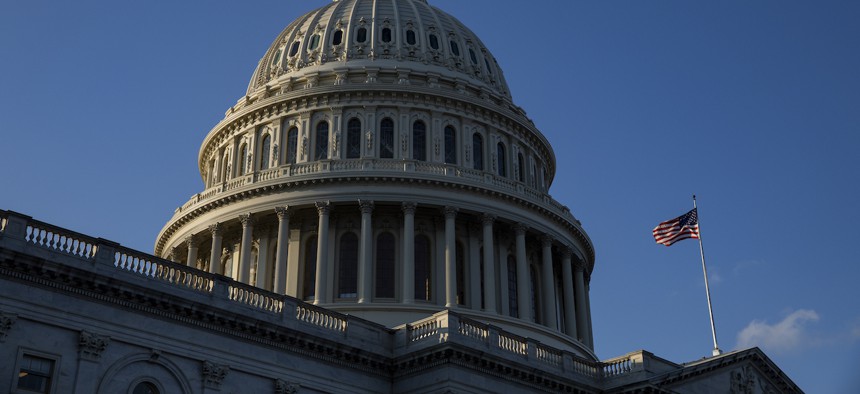
The Limiting the Intrusive Bureaucracy and Empowering Regulatory Transparency for You (LIBERTY) Act was introduced by a bipartisan pair of lawmakers. Samuel Corum/Getty Images
Lawmakers: Treat Agency Guidance the Same As Rules and Regulations
New bill would ensure oversight for additional agency policies.
A bipartisan pair of lawmakers is pushing for more oversight of agency actions that do not require the same process as formal regulations, saying the current structure creates a loophole for federal employees to sidestep transparency.
The Limiting the Intrusive Bureaucracy and Empowering Regulatory Transparency for You (LIBERTY) Act (H.R. 3770) would treat any agency guidance in the same manner as rules and regulations. As a result, any guidance an agency put forward that would come with a price tag of at least $100 million, include significant costs for consumers or industry, or impact competition or innovation would have to go through a public notice and comment period. They would also become subject to a legislative veto through the Congressional Review Act.
“Our government is built on a balance of power, yet current law allows the president and the executive branch to unilaterally implement legislation that Congress passes without proper oversight,” said Rep. Jared Golden, D-Maine, a cosponsor on the bill. “This bipartisan bill would simply give Congress the oversight power needed to ensure that the bills passed by Congress are implemented as they were intended to be.”
The measure would include any agency guidance that sets policy on a statutory, regulatory or technical issue. Any agency issuance that materially altered the budgetary impact of a program, or the rights of its recipients, would also fall under the new requirements. It would not impact strictly internal guidance, such as that focused on agency management or personnel.
Rep. Dave Joyce, R-Ohio, pointed to President Biden’s student loan forgiveness plan as a guidance document that would be subject to the Liberty Act.
“At a time when Washington spending is out of control, this legislation will provide critical balance and oversight to the agency guidance process,” Joyce said.
Republicans have for many years sought to pass the Regulations from the Executive in Scrutiny (REINS) Act, which would require Congress to affirmatively sign off on any major agency rule using the same definitions as the LIBERTY Act. They renewed their push during the recent negotiations to increase the debt ceiling, but the provision was dropped from the final agreement.
Robin Walker, senior federal affairs director for the conservative think tank Foundation for Government Accountability, said the bill would shine a light on additional government action and bring more power to elected officials.
“Agency bureaucrats always seek the path of least resistance,” Walker said. When it comes to making regulations with the force of law, they find creative ways to sidestep the normal rulemaking process and avoid public scrutiny by issuing guidance.”







